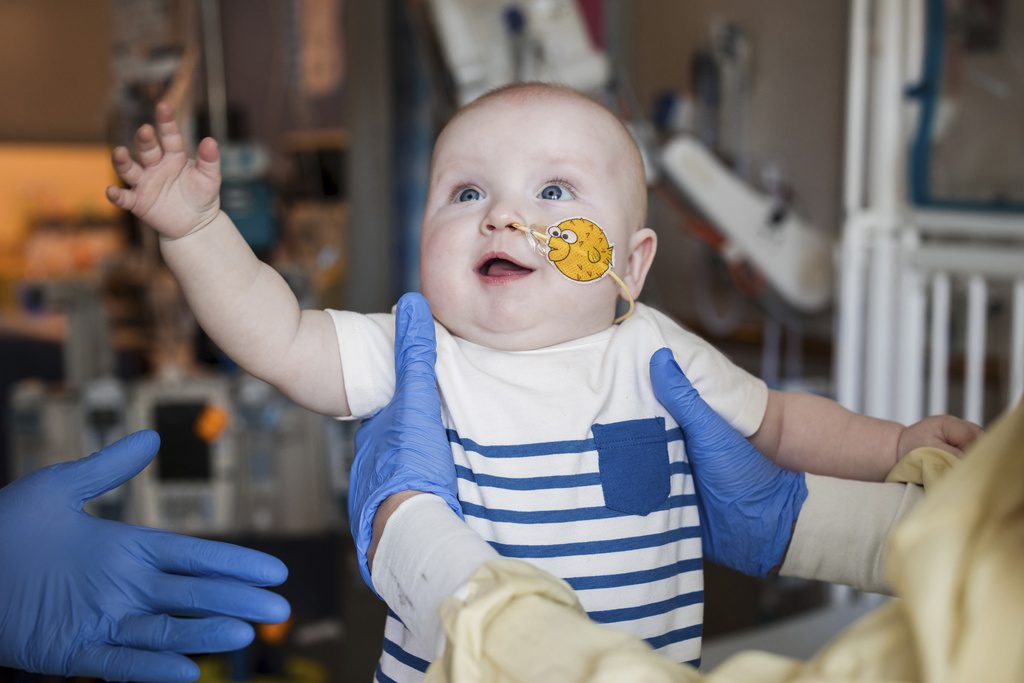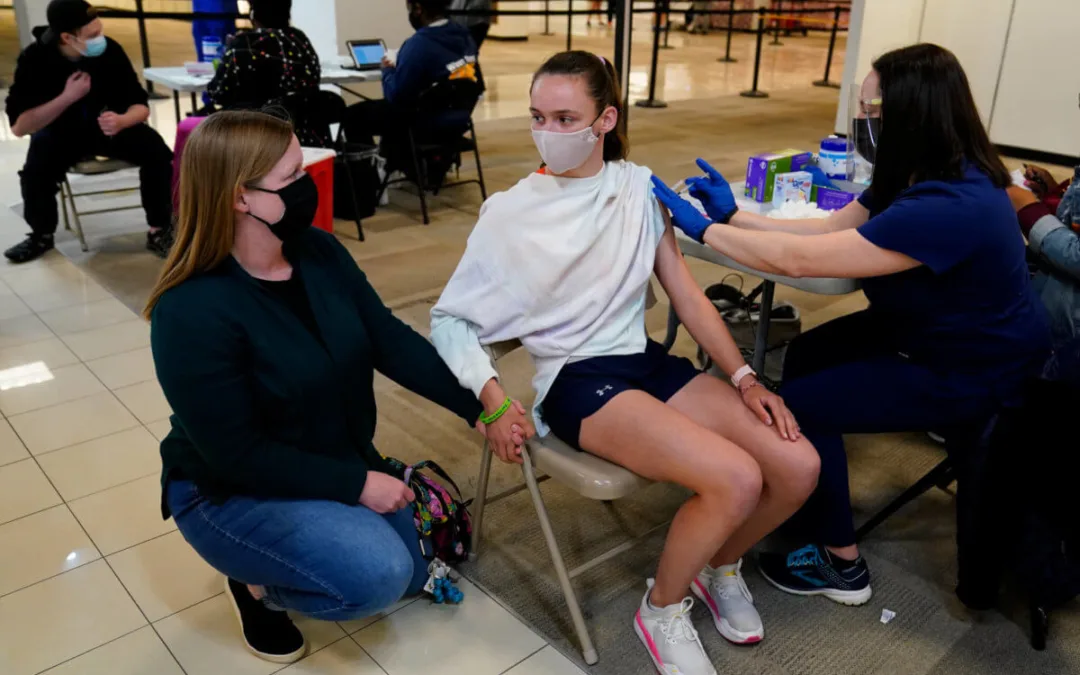
This photo provided by the Children's Hospital of Philadelphia shows KJ Muldoon after a follow up dose of an experimental gene editing treatment at the hospital in April 2025. (Chloe Dawson/Children's Hospital of Philadelphia via AP)
Researchers described the case in a new study, saying the baby is among the first to be successfully treated with a custom therapy that seeks to fix a tiny but critical error in his genetic code that kills half of affected infants.
A baby born with a rare and dangerous genetic disease is growing and thriving after getting an experimental gene editing treatment made just for him.
Researchers described the case in a new study, saying he’s among the first to be successfully treated with a custom therapy that seeks to fix a tiny but critical error in his genetic code that kills half of affected infants. Though it may be a while before similar personalized treatments are available for others, doctors hope the technology can someday help the millions left behind even as genetic medicine has advanced because their conditions are so rare.
“This is the first step towards the use of gene editing therapies to treat a wide variety of rare genetic disorders for which there are currently no definitive medical treatments,” said Dr. Kiran Musunuru, a University of Pennsylvania gene editing expert who co-authored the study published Thursday in the New England Journal of Medicine.
The baby, KJ Muldoon of Clifton Heights, Pennsylvania, is one of 350 million people worldwide with rare diseases, most of which are genetic. He was diagnosed shortly after birth with severe CPS1 deficiency, estimated by some experts to affect around one in a million babies. Those infants lack an enzyme needed to help remove ammonia from the body, so it can build up in their blood and become toxic. A liver transplant is an option for some.
Knowing KJ’s odds, parents Kyle and Nicole Muldoon, both 34, worried they could lose him.
“We were, like, you know, weighing all the options, asking all the questions for either the liver transplant, which is invasive, or something that’s never been done before,” Nicole said.
“We prayed, we talked to people, we gathered information, and we eventually decided that this was the way we were going to go,” her husband added.
Within six months, the team at Children’s Hospital of Philadelphia and Penn Medicine, along with their partners, created a therapy designed to correct KJ’s faulty gene. They used CRISPR, the gene editing tool that won its inventors the Nobel Prize in 2020. Instead of cutting the DNA strand like the first CRISPR approaches, doctors employed a technique that flips the mutated DNA “letter” — also known as a base — to the correct type. Known as “base editing,” it reduces the risk of unintended genetic changes.
It’s “very exciting” that the team created the therapy so quickly, said gene therapy researcher Senthil Bhoopalan at St. Jude Children’s Research Hospital in Memphis, who wasn’t involved in the study. “This really sets the pace and the benchmark for such approaches.”
In February, KJ got his first IV infusion with the gene editing therapy, delivered through tiny fatty droplets called lipid nanoparticles that are taken up by liver cells.
While the room was abuzz with excitement that day, “he slept through the entire thing,” recalled study author Dr. Rebecca Ahrens-Nicklas, a gene therapy expert at CHOP.
After follow-up doses in March and April, KJ has been able to eat more normally and has recovered well from illnesses like colds, which can strain the body and exacerbate symptoms of CPS1. The 9 ½-month old also takes less medication.
Considering his poor prognosis earlier, “any time we see even the smallest milestone that he’s meeting – like a little wave or rolling over – that’s a big moment for us,” his mother said.
Still, researchers caution that it’s only been a few months. They’ll need to watch him for years.
“We’re still very much in the early stages of understanding what this medication may have done for KJ,” Ahrens-Nicklas said. “But every day, he’s showing us signs that he’s growing and thriving.”
Researchers hope what they learn from KJ will help other rare disease patients.
Gene therapies, which can be extremely expensive to develop, generally target more common disorders in part for simple financial reasons: more patients mean potentially more sales, which can help pay the development costs and generate more profit. The first CRISPR therapy approved by the U.S. Food and Drug Administration, for example, treats sickle cell disease, a painful blood disorder affecting millions worldwide.
Musunuru said his team’s work — funded in part by the National Institutes of Health — showed that creating a custom treatment doesn’t have to be prohibitively expensive. The cost was “not far off” from the $800,000-plus for an average liver transplant and related care, he said.
“As we get better and better at making these therapies and shorten the time frame even more, economies of scale will kick in and I would expect the costs to come down,” Musunuru said.
Scientists also won’t have to redo all the initial work every time they create a customized therapy, Bhoopalan said, so this research “sets the stage” for treating other rare conditions.
Carlos Moraes, a neurology professor at the University of Miami who wasn’t involved with the study, said research like this opens the door to more advances.
“Once someone comes with a breakthrough like this, it will take no time” for other teams to apply the lessons and move forward, he said. “There are barriers, but I predict that they are going to be crossed in the next five to 10 years. Then the whole field will move as a block because we’re pretty much ready.”

Pa. House committee vote is the latest move to protect vaccine access amid CDC shakeups
It passed on party lines, with 14 Democrats in favor and 12 Republicans opposed. The state House Insurance Committee passed a measure Tuesday to...

Rob Bresnahan’s constituents hold vigil for Pennsylvanians who’ll lose health care coverage
Pennie, the state’s health care marketplace, could lose close to half of its customers if Republicans allow federal tax credits to expire at the end...

Gov. Shapiro advances plan to shield Pa. from Trump admin policies on childhood vaccines
Gov. Josh Shapiro has unveiled a broad plan to protect access to childhood vaccines in Pennsylvania, attempting to shield the commonwealth from any...

Patients at Pa. hospitals fight DOJ’s demand for gender-affirming care records
University of Pittsburgh Medical Center and Children’s Hospital of Philadelphia received subpoenas in June. Families of children who received...

Trump officials warn pregnant women about Tylenol. Western Pennsylvania doctors offer second opinion
Dr. Devon Ramaeker, who treats women with some of the highest-risk pregnancies in western Pennsylvania, has advice for those who are concerned about...




